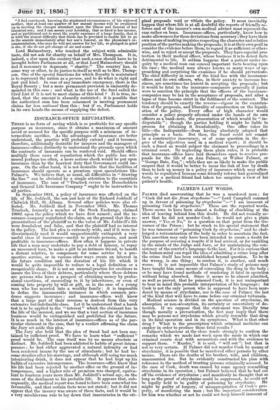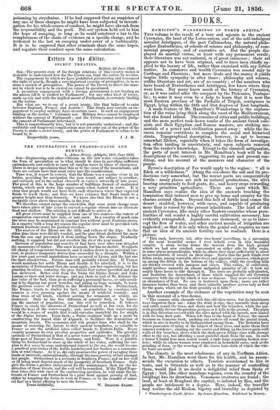PALMER'S LAST WORDS.
PAINKB, died asseverating that he was a murdered man; for "Cook did not die from strychnine"—" Lord Campbell summed up in favour of poisoning by strychnine "—" I am innocent, of poisoning Cook by strychnine." These are the reported words. There seems to have been almost a feeling of chuckling at the idea of leaving behind him this doubt. He did not roundly as- sert that he did not murder Cook; he would not give a plain answer, "Yes or No," to a question on that point from the Go- vernor of the Prison ; but he stack to his special statement that he was innocent of "poisoning Cook by strychnine," and he chal- lenged a reexamination of the body in order to ascertain the fact. This assertion may only have been intended to create a doubt for the purpose of covering a respite if it had arrived, or for rankling in the minds of the Judge and Jury, or for maintaining the con- sistency of the convict's language to the last. For it is curious that the human mind can repel the idea of admitting a crime long after the crime itself has been established beyond question. To be in the wrong, is one thing ; to confess it, is another, and muck worse. It is not impossible that Palmer's study of poisons may have taught him some means of concealing the drug in the body ; or he may have found methods of rendering it fatal in operation without being absorbed. Since it seems to be almost adin • Ited, as well as proved, that he poisoned Cook, it is not unimportant to bear in mind this probable interpretation of his language; for Cook is not the only person who is supposed to have been mur- dered by means of strychnine, nor is the case of Palmer the last of the kind that will have to come before our criminal tribunals.
Medical science is divided on the question of strychnine, its absorption or non-absorption, its certainty or uncertainty of de- tection. If we suppose that the statement was literally true though morally a prevarication, the fact may imply that there may be poisons not strychnine which greatly resemble that drag in its fatal operation and in its symptoms. What is that other drug? What is the prescription which criminal medicine can employ in order to produce those fatal results ? Palmer's behaviour at the close tends strongly to confirm the remarks which we made last week upon the mode in which our criminal courts deal with accusations and with the evidence to support them. " Murder," it is said, " will out "; but that is not so very certain. If Palmer did not murder Cook by means of strychnine, it is possible that he murdered other persons by other means. There are the deaths of his brother, wife and children, unaccounted for. But he evidently constructed his plan with reference to the method of treating persons criminally accused. In the case of Cook, death was caused by some agency resembling strychnine in its operation • but Palmer believed that he had out off the evidence of strychnine ; and manifestly he thought that so long as the proof of strychnine could be suppressed, he could not be legally held to be guilty of poisoning by strychnine. He might be guilty of forgery, of misappropriation of Cook's pro- perty, of murdering the man ; but the important consideration for him was whether or not he could not keep himself innocent of poisoning by strychnine. If he had supposed that on suspicion of Any one of these charges he might have been subjected to investi- gation for his whole course of conduct, he might have shrunk from the responsibility and the peril. But our system held out to him the hope of escaping, so long as he could construct a bar to the .completeness of the chain of evidence on a specific charge, and he reckoned to the last on escaping under cover of a technicality. It is to be supposed that other criminals share the same hopes, and regulate their conduct upon the same calculation.



























 Previous page
Previous page